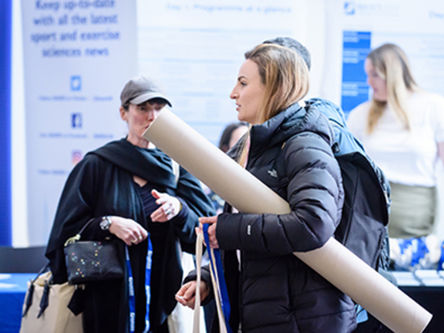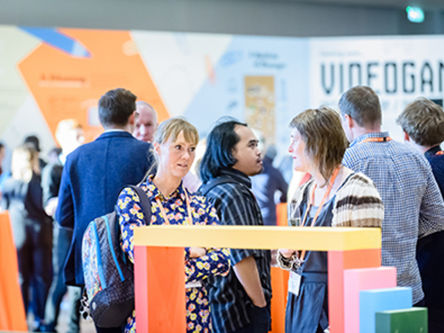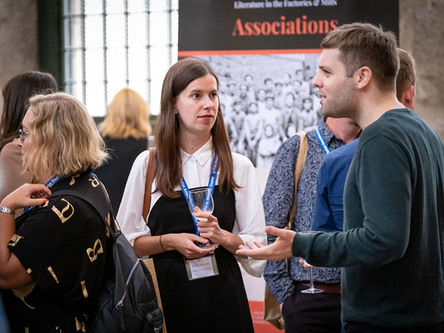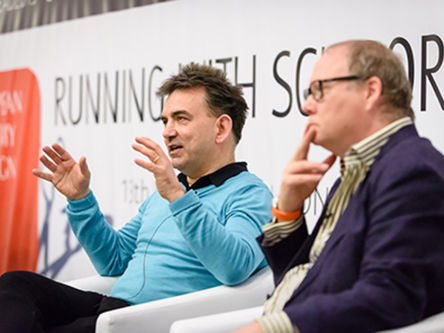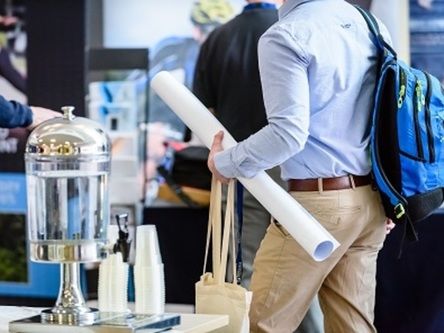Fast Facts
Dates - 29th-31st March 2017
Venue - Malmaison Dundee
Delivery Partners - The James Hutton Institute, Dundee City Region Convention Bureau
Attendance - 60 delegates from 13 countries
Impact on the local economy - £73,333.80
Landscape Management for Functional Biodiversity
The aim of the 7th IOBC/WPRS Working Group Meeting was to bring together scientists with land managers, conservation bodies and other stakeholders in order to discuss the latest advance in research, development and application of landscape management for functional biodiversity.
The conference aimed to identify barriers to landscape management and opportunities to tackle these, and attracted delegates from across Europe, South America and Canada to Dundee City Region.
The working group meets every other year and, through a series of presentations, topical discussions and field visits, aims to encourage research in improving farming system performance, in particular pest, disease and weed management.
Liaising with the team at Dundee City Region Convention Bureau (DCRCB), the Ecological Sciences department at The James Hutton Institute delivered the conference, organised by Dr Graham Begg and Professor Nick Birch on behalf of the International Organisation for Biological and Integrated Control (IOBC) – West Palaearctic Regional Section (WPRS).
Professor Birch says, “The IOBC is a global organisation, and each of its working groups specialises in a particular topic. The focus of this group is landscape ecology and the management of landscapes, bringing together scientists and PhD students from across Europe. These working group meetings are designed to be less formal than traditional academic conferences, encouraging communication and new collaborations.”
Why Dundee?
The working group’s first meeting was held in Bologna in 2003, and subsequently around the world in locations including Bordeaux, Zurich-Reckenholz and Poznan. It was decided that the 2017 meeting would be held in Dundee, to draw upon the James Hutton Institute’s invaluable expertise and the region’s prime examples of what the group would be discussing.
When searching for a suitable venue, the organisers sought somewhere with character that showed off the best Dundee has to offer: their choice, the Malmaison Dundee. Professor Birch explains, “The Malmaison Dundee isn’t a bland, modern hotel; it’s a bit different, and adds some of the character of Dundee.
“The staff at the hotel were very understanding, and everyone involved was keen to make the event the best it could be. The hotel provided a much-needed flexibility in laying out the rooms for different sessions and really helped us show Dundee off to the international delegates. The opportunity to have the meeting, accommodation and catering all in one place was very attractive.”
One of the highlights of the working group meeting was undoubtedly the Farm to Fork excursion – an opportunity for delegates to remove themselves from meeting for half a day and experience what landscape management for functional biodiversity means in practice. 
Visiting a number of Dundee and Angus’ farms and food producers – including Angus Soft Fruits and Omachie Farm – enabled delegates to see the theories they had discussed in action, while sampling some of the region’s finest produce. What followed was a conference dinner hosted at Forbes of Kingennie, which again showcased delicious local fare in the farmer’s own establishment.
Professor Birch says, “The Farm to Fork afternoon allowed all of the working group members to get out into Dundee and Angus; to get a taste of the type of agriculture we have here, and see the way farms are run in terms of the management of land and landscape.
“We visited two very different farms – one we had worked with in the past, and one suggested by Dundee City Region Convention Bureau. While these excursions are a regular part of the working group meetings around the world, we really wanted to do something different and take it to a higher level.
“We wanted to integrate the excursion more closely with the themes of the meeting; it was our aim to tie everything together and make it one continuous story to really emphasise the regional connections to the delegates.
“As part of this day, we decided that we wanted to incorporate a mini food fair so that we could show delegates a wider variety of local produce, allowing them to sample it and to discover how it was produced. The team at Dundee City Region Convention Bureau provided us with a list of local producers they had worked with in the past, identifying soft fruit producers and farms which promote renewable energy, to really tie in with the themes of the conference.
“This allowed the day to flow nicely, from farm visits to produce tasting through to the dinner, during which the chef came out and explained how everything was produced on the plate. It gave the delegates a view of the full journey from the field to the plate.”
Throughout the organisation of the event, Dundee City Region Convention Bureau (DCRCB) worked with Professor Birch and Dr Begg to bring together the elements required for a successful meeting – support which was greatly appreciated by the organisers. Professor Birch explains, “We collaborated regularly with DCRCB while organising the meeting, and they really helped us with forward planning. DCRCB also aided us massively with the logistics of the conference, helping with timetabling and allocating resources to each session, advertising the conference to delegates, and organising free shuttle buses from Edinburgh Airport to provide delegates an easy route to Dundee.”
“It can be difficult for scientists to organise events like this, as we are normally so focused on research, so to be able to draw on the expertise and experience of the team at Dundee City Region Convention Bureau was essential to the success of the working group meeting. We couldn’t have done it without them.”
Beyond the Conference
Many delegates who attended the working group meeting extended their stay in Dundee City Region to visit the James Hutton Institute to see the research being undertaken and the facilities on offer. This additional time allowed delegates not only to experience the academic aspects of the region, but also the cultural side which can lead to further visits – working group members often revisit meeting locations for family holidays.
Academically, the working group meeting allowed a new generation of researchers the chance to be a part of an important, international event. Professor Birch says, “The purpose of these working group meetings is to exchange ideas and set up new collaborations. It allows young scientists to get involved in academic events at an early stage in their career, and build networks for the future.
“PhD researchers – many of whom are based in Dundee – gave short talks and presentations, allowing them to network with scientists from around the world and creating strong bonds between Dundee and Angus and other regions.
“On a larger scale, the work undertaken by the working group will allow us to access several European consortia worth millions of euros, enabling us to collaborate internationally on common-themed research projects, and share expertise and knowledge.
“While organising the IOBC/WPRS working group meeting takes a lot of work, it is a real investment for the future.”
Delegate Comments
“All presentations were very interesting.”
“I had opportunities to have a scientific baseline for discussion thanks to the focused thematic of the conference, the limited number of participants, and good quality and diversified talks.”
“The whole conference was exceptionally well organised. The cherry on top was the Farm to Fork field excursion and conference dinner.”

